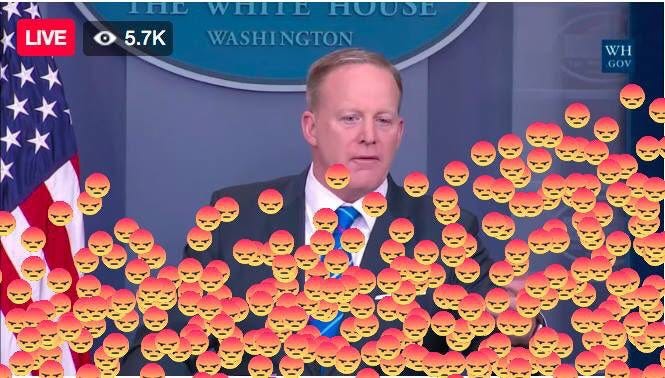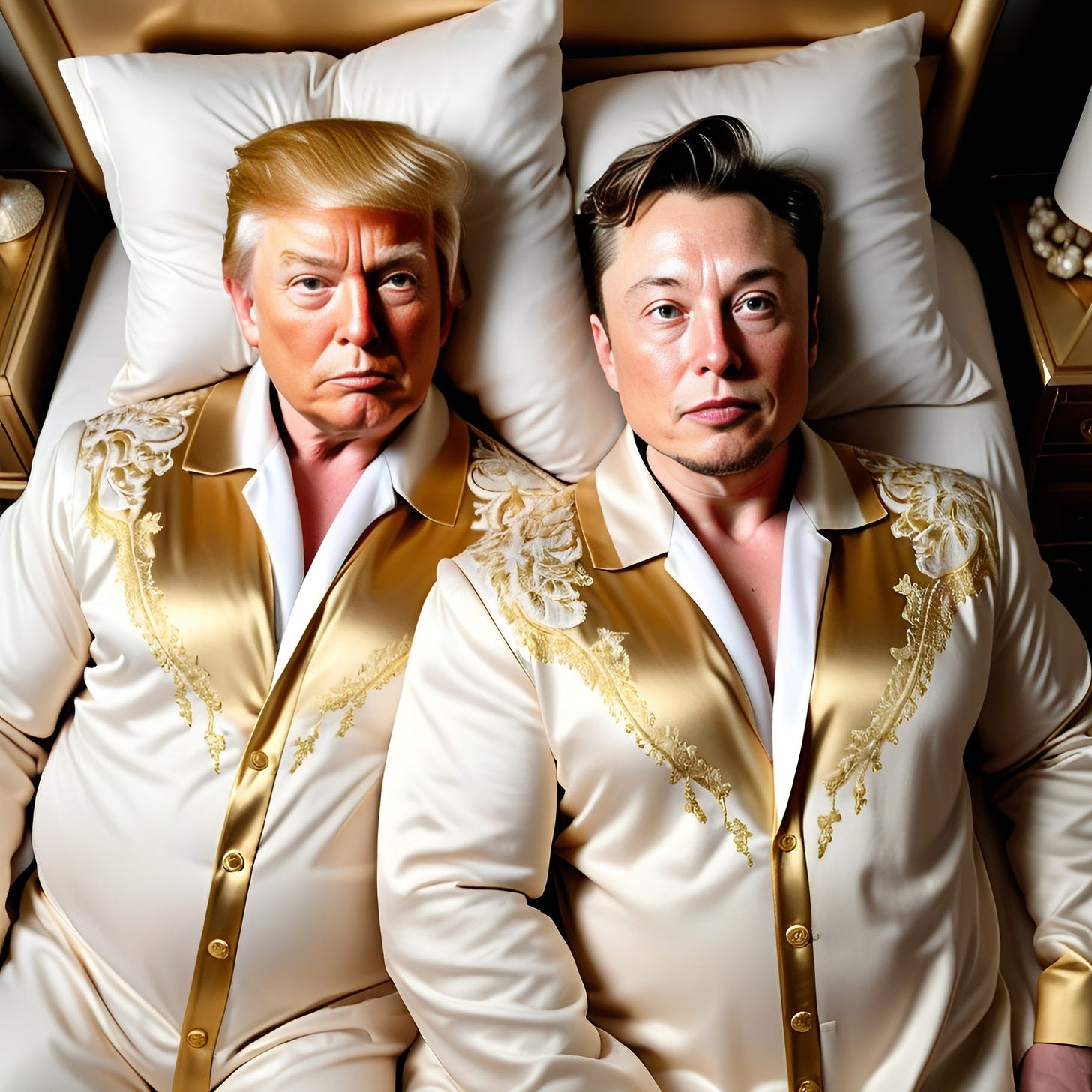This particular Crisis Era and what comes next
Plus: Why the Elon/Trump alliance is even more corrupt than you think; the New England college time warp; and remembering one of the great dotcom failures
This issue is going to go to a dark place — with a light at the end, I promise — so let’s start with some happy stuff: I’m back from visiting my daughter at her Small New England Liberal Arts College (SNELAC) last weekend. It was a delightful visit in the peak of autumn’s glory.
I went to a different SNELAC from my daughter. But even after almost 30 years, I couldn’t believe how familiar everything felt. Yes, today The Phones make it easier to find your friends, but otherwise things are shockingly unchanged from the early ‘90s. I heard Smashing Pumpkins and Cypress Hill around campus, and formless grunge outfits and ironic vintage are definitely back in fashion. Maybe they never left. You’ll find a basket of condoms in the lobby of the dorm, and kids still get drunk sometimes.
But not all of the retro culture is positive. For example, the kids are smoking cigarettes again. Cigarettes! I hadn’t smelled that much tobacco smoke and seen that many discarded butts in a long time.
Given the moral panic over Wokeness Gone Wild on college campuses, I asked my kid and her friends how free speech was going. They had mixed responses: On one hand, the school president had issued new “acceptable protest” guidelines that a lot of people thought went way too far, and so a group of students staged a walkout that was itself a deliberate violation of the protest rules. It seems to have worked, and the protest rules are under revision.
Additionally, trigger/content warnings seem to have found a comfortable altitude, with now a general acceptance that they’re to be applied to graphic descriptions of sexual assault and other personal traumas. But also professors are comfortable expressing that difficult material is part of the educational experience, so y’all need to deal with it.
In general, the familiarity of the SNELAC weekend was very comforting, especially compared with the lazy river-ization of large campuses, the corporate outsourcing of college dining to the likes of Subway and Panda Express, and the general devaluation of academic rigor that we hear so much about. I don’t know if it’s good or bad that the SNELAC experience feels so unchanged from the 1990s, but as an old fart, I enjoyed feeling like I was home again.
How important is this election, really?
Nobody knows what’s going to happen next Tuesday, except that it won’t be over that night. How scary will it get? Worse than January 2021? Yeah, maybe.
My take: Harris is probably going to win both the popular vote and the electoral college. I feel more confident about Democratic victory than 2016, and about as confident as 2020. I’m also prepared for millions of white people to emerge from the exurbs and small towns and push Trump over the top. Nobody knows.
I think Harris has run about as impeccable a campaign as she could have, and her GOTV effort is miles ahead of Trump’s. I also think Trump has run about as clumsy and ham-handed a campaign as anyone has, including his own in 2016. I also think the polls are more cooked than ever.
So at this point, it’s not really about whether Harris has done the right things to get elected, but it’s about whether enough American voters prefer Trump’s radical dark fantasies and the team of sociopaths he surrounds himself with. And also whether the election officials and courts will do their jobs with sanity and fairness.
I want to take a moment to put this election into one particular big-picture perspective. I’m not sure if this is going to be comforting or terrifying, but it fits with my general philosophy that nobody really knows whether any individual event — even a seemingly significant one like an election — is good or bad in the long run.
In 1997, William Strauss and Neil Howe published The Fourth Turning, their seminal work on their theory of how societies rotate among phases that each mimic a human generation (about 20-21 years). It was a successful book, although not without its skeptics and detractors. (Howe recently published a sequel called The Fourth Turning is Here.)
This super-cycle follows four generational themes: a chaotic “Crisis” period, followed by a conformist “High” period, then an “Awakening” when individualism starts to break down institutions, then an “Unraveling” where the institutions start to fail. Then we get another Crisis period, and the cycle starts anew. The whole process takes around 80-85 years and then repeats. It feels both correct and also highly deterministic and unproveable.
Through this lens, America (and much of the world) experienced the last High period coming out of the Crisis Era of the Great Depression and WWII, with the Awakening starting in the mid-1960s, then the Unraveling starting in the mid-to late-’80s, and we’re now firmly ensconced in a late Crisis period. This era kicked off with the financial collapse of 2008, and then Big Tech supplanting major institutions, loss of trust in nearly everything, fake news, cyber warfare, pandemic, consolidation of wealth, Brexit, Trump, Elon, January 6, and the breakdown of the post-war order. We’ve got another 5-to-8 years of this, during which things could get bad.
The billionaire investor Ray Dallio also sees signs of America’s decline in a historical context. In Principles for Dealing with the Changing World Order, Dallio tracks sees parallels between 2020s America and other collapsed empires through history. TL;DR: Empires all eventually end up printing money and defunding the stuff that actually made them powerful in the first place. It’s hard to look at post-9/11 America and not see exactly that, with massive federal and trade deficits, under-investment in infrastructure and education, and mountains of debt.
So while we’re focusing on the “wokelash” and undecided swing state voters and who called whom “garbage,” America’s current disintegration is being foretold by history. Eventually we’re going to have a public debt crisis, a major wave of domestic violence, and/or a big war. I’ve read several historians and futurists note that the back half of the 2020s are probably going to be ugly and scary, like 1930s-40s ugly and scary.
And then the 2030s could actually be pretty great. 🤞 Maybe the Millennials/Gen Z will save the world after all?
Hate the player, despise the game
But in the meantime we’re all really anxious and freaked out about the election on Tuesday. We also know that the election itself is just the starting point for months of mayhem,. We’ve already seen someone burn a ballot box in the Portland suburb of Vancouver, Wash., and it’s been well-reported how many longstanding election officials have quit under the pressure of constant threats of violence, often replaced in their jobs by the kinds of radical weirdos who could have made those threats themselves.
Trump himself at his 1939-style NYC Rally hinted at some secret plan that Speaker Mike Johnson was cooking up. Given how most Republican members of Congress actually voted to reject the 2020 election, it’s easy to imagine various Constitutional gimmicks to try to overturn the results of the 2024 election if Harris were to win, with a compliant Supreme Court ready to legitimize permanent minority rule.
If you were to describe the situation in the USA over the past four years without knowing it was the USA, you’d recognize it as fully corrupt. Let’s play a game: Imagine that a president of a nameless country were to lose his bid for re-election, and not even that closely. So he incites a mob of citizens to infiltrate the capitol building and foment a violent revolution. The coup fails, but only barely. Eventually this ex-president is forced from office.
What should that country do next? If it’s an extraordinarily merciful one, it imprisons or exiles this treasonous ex-president. A lot of countries would probably treat this insurrection even more severely.
None of that happened here. Trump is still a free man, on the precipice of returning to the highest office in the land. Somehow four f***ing years after attempting an actual violent coup, he’s not in prison. The Washington establishment failed to imagine that millions of Americans would cherish his return. Merrick Garland assumed that after January 6th, Trump was finished.
I don’t understand how he missed this. Trump got 74 million votes for reelection even after the mayhem of his four years in office. If it hadn’t been for the pandemic, he might have cruised to reelection in a landslide.
But Trump continuing to freely run for office after attempting to seize it with mob violence is just one symptom of our failed political and legal systems, which are unlikely to change without a crisis far worse than the 2008 financial collapse.
After its recent, radical rulings about presidential immunity and how corporations are regulated, the Supreme Court has rendered our government a tinderbox. Trump and Vance and Elon are standing there with flamethrowers. But even if we beat them Tuesday, the wood will remain dry and somebody eventually is going to strike a match. And the next crisis may start the fire for us.
This may seem terrifying, and it is. But also, America needs a controlled burn! Our deficit is almost 7% of GDP, which is a wartime level, and interest on the national debt is now our biggest expense. Our military empire is unsustainable. Our health care system still eats up about one-fifth of our economy because it can. Our primary educational system is underfunded and our secondary educational system is misdirected. Climate change is rapidly transforming how people live — homes on the Gulf Coast and in the western forests are uninsurable. Most of our country’s wealth is owned by people over 60, and most younger people don’t see a realistic path to prosperity. And birthrates are so low that we’ll struggle to support all the people who are too old to work.
We saw all these problems coming decades ago, but our political and economic systems are too focused on the short term to fix them. And we don’t trust “the other side” enough to cooperate on complicated issues.
Religious zealots always believe that we’re in the End Times. Or at least their leaders sell this idea because it’s profitable for them. But you can be a stone-cold atheist and feel that way, too.
And that’s why I find the generational model of society strangely comforting. Because this Crisis Era is indeed an End Times, but it’s only the end of something, not everything. And then we’ll experience something new, a High Era when we unite and rebuild. Winter is here, but spring is coming.
Kamala Harris can’t stop history, and neither can Donald Trump or Elon Musk. But I know the former will preserve the rights and prosperity of Americans for a while longer, and the latter will harm a lot of people to benefit a few. (Billionaires have donated 18% of the total funds raised by Harris and Trump, but 82% of that money has flowed to Trump.)
Twenty years ago, I had no reason to believe that our newly-elected SF District Attorney would be singlehandedly responsible for defending the future of American democracy and human rights from the star of a dumb TV game show. She’s done all she can since she entered the race in July. Now it’s incumbent on a few thousand people in a few states to decide how soon we burn down the house.
How corrupt is the Trump / Elon relationship?
I think we shouldn’t understate how corrupt Elon’s involvement in this campaign is, both in theory and practice. It’s always worth abstracting a situation to really understand it, so let’s review:
The richest man in the world, with a net worth a quarter trillion dollars, is spending unlimited money to get Trump elected President. He’s also brazenly breaking election laws to make this happen, with the assumption that none of them will be enforced by the federal authorities if he’s successful.
Elon also owns a massive and influential social network, over which he has complete control and has exerted the type of power that a old-tyme newspaperman would over his printing presses. He’s using this social network to share misinformation and Russian disinformation, and harass fact-checkers, all in the service of Trump being elected president.
Should Trump lose the Electoral College, Elon will spend unlimited money fighting to overturn the election results via state governments, the Courts, and amplifying misinformation.
In exchange for his support, Trump has publicly promised that Elon Musk will be in charge of deciding which federal spending to cut or cancel. (Elon has promised he could cut $2 trillion of spending, which is a number that isn’t to be taken seriously.)
If “the world’s richest man purchasing an immensely powerful role in the federal government” doesn’t give you hives, note that:
Elon is also a major federal supplier with $3B in contracts and total control over NASA’s launch schedule
Elon’s companies are under at least 20 federal criminal and civil investigations
For Elon to have any role at all in the executive branch is a major conflict of interest, and Trump selling him the power to fund or defund other companies would be baldly corrupt. The fox has put in a bid to purchase the henhouse.
But that’s not all! Trump is himself a walking (limping) conflict of interest. You may remember that in 2017 he held a press conference with fake paperwork, where he lied about divesting control of his businesses upon taking office. He’s since quintupled the price of joining Mar-a-Lago, and ran the most overpriced hotel in the history of Washington, where you had to stay if you wanted to meet with him. His son-in-law and daughter, both policy fixtures in his last administration, have been accepting multi-billion-dollar deals with foreign governments, based on no legitimate business track record.
Since leaving office, Trump has launched a number of shady crypto scams, but his biggest money scam of all is his social network Truth Social, which is worth somewhere between $3B and $12B depending on the day of the week, in spite of almost no revenue and heavy losses.
So he and Elon are essentially competitors in the for-profit misinformation industry, but they are conspiring for the same goal of redirecting federal spending and law enforcement to harass their competitors. X could acquire Trump Media after the election, which would essentially be a multi-billion-dollar direct payment from Elon to Trump, laundered through public markets.
Wonderful.
Rangelife Shorts
Remembering Webvan. I have no idea why SFGate decided to do a look back at one of the great failures of the dotcom 1.0 era, but I’m glad they did. In 1999, I was preparing to leave my big consulting firm for graduate school when our CEO announced he was quitting to run… an online grocery store? I used Webvan twice after I moved to Berkeley, and it was actually an amazing experience, significantly better than ordering groceries from Whole Foods or Safeway today. Apparently that was because they were flushing an incredible amount of investors’ money on every order. What a time 1998-2001 was.
Asking People in 1990 Chicago What They Think about White People / Black People. This goes a lot better than you might expect.
The USA from the Viewpoint of a 31st-Century Archaeologist. This is worth clicking and zooming and looking all around. It’s full of little delights about how someone 1,000 years from now might interpret and misinterpret today’s America, and it’s a reminder of how much license we take with our understanding of how people lived through ancient history.
Black Balloons (Reprise). Did you know that many of your favorite songs have music videos? I don’t understand how I spend so much time on YouTube and Spotify, and yet I continually fail to connect these dots. Anyway, the video to Flying Lotus and Denzel Curry’s “Black Balloons (Reprise)” is loaded with metaphor and religious ambiguity. It’s also worthy of the song, which is one of the underrated bangers of the past decade.









Thanks for this. Great read. Commenting on a small item nestled within - the item about printing money - it was interesting to read this today, *right after* reading your epistle. https://www.gsb.stanford.edu/insights/united-states-borrowing-binge-about-burst
I live in Pittsburgh which has somehow become ‘the’ place that both parties are trying to tip to their favor. It’s is total insanity here. Pittsburgh public Schools have a 1/2 day tomorrow because of the influx of people that will be in the city because BOTH Harris and Trump will be here having rallies. It is really weird when you keep being told that where u live could decide the election. And I get it, we are a microcosm of the country in a way, City is ‘blue’ but the suburbs are purple and the further out you go, the redder it gets (there are so, so many side of the road Trump stores just outside the city - we see them driving to our kid’s hs soccer games against teams in these areas). My neighborhood is blue as it can be and there are still Trumpers and lots of Dave McCormick signs (please give $ to Bob Casey). Everyone is on edge here. It doesn’t feel hopeful. I’m not anywhere as confident as you are Eric about the outcome of this election.